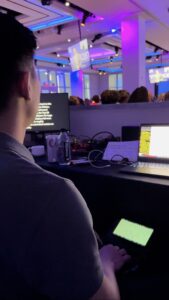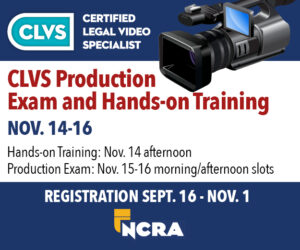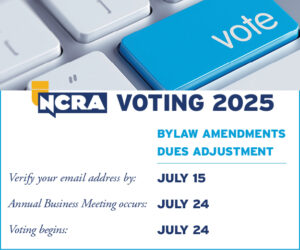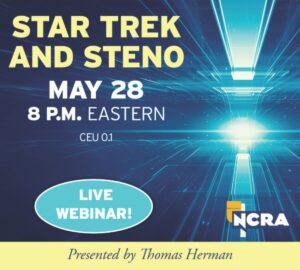Whether attending the live workshop at the annual convention or taking the e-seminar now available for the new Certified Realtime Captioner certification, NCRA members can expect content that is extensive and cutting edge. The workshop covers topics that range from an overview of captioning to setting up a home office to preparing for an assignment and delivering the final product.
The workshop’s syllabus, which includes 11 sessions, is taught by experts seasoned in providing realtime broadcast captioning and CART services, and it spans a total of 10.5 hours of instruction.
The first CRC workshop, held during the 2015 NCRA Convention & Expo in New York City, drew a healthy number of attendees eager to earn the new certification that combines the highly specialized training formerly given to candidates for the Certified Broadcast Captioner and Certified CART Provider certifications in one program. According to a number of the attendees who participated in the first workshop, they were not disappointed.
“I took this workshop because I strive for excellence in the field of court reporting, and I believe that as a professional, I should be prepared to take any type of assignment,” said Viola Zborowski, RMR, CRR, CRC, a freelance court reporter from Long Valley, N.J. “Being able to write well enough to be a CART captioner and having that NCRA certification is the backbone to my self-esteem and confidence,” she said.
“I was very excited to hear that the workshop was being given at the NCRA Convention in New York,” said Devon Gerber, RPR, a freelance reporter from East Brunswick, N.J., who is focused on CART and captioning.
“I knew that the CRC was something I wanted to obtain. Not only did I receive a great education about realtime writing, but I was also able to hear the experiences shared by veteran realtime reporters in a fun and relaxed environment,” said Gerber.
According to members of NCRA’s Certified Broadcast Captioner and Certified CART Provider Committee, who were charged with developing the requirements to earn the new certification, the move to combine the CBC and CPC and create the CRC is expected to result in the certification of more individuals and provide them with the tools necessary to be successful in the field. In addition, the training also covers making the change from legal court reporting to captioning.
“I took the CRC workshop for the continuing education credits but was wonderfully surprised to get so much more out of it,” said Susan A. Zielie, RMR, an official reporter from New Orleans, La., with 30 years of experience. “This particular workshop was jam-packed with useful information. It was not the typical workshop where the instructors repeat the same material over and over. I have always been a judicial reporter, so I’m new to the captioning world. Fortunately I was surrounded by working captioners, and they also expressed learning valuable information during the seminar, as well as contributing valuable information.”
Other topics covered in the CRC workshop include transitioning to captioning, creating dictionaries, reviewing your writing, and an exploration of CART and captioning venues. In addition, attendees learn about the professional standards and guidelines governing captioning, as well as catch a glimpse of a day in the life of certified realtime captioner.
“This workshop was taught by a whole host of professional reporters, not just one or two, all of them experts in their own right. It was such an honor to be taught by them. The course was intense but fantastic. I would recommend it to everyone,” said Zborowski.
“I would absolutely encourage others to participate in the workshop. Realtime reporting is the future of our field and something that I am proud to be a part of,” said Gerber. “The opportunities for realtime writers are out there just waiting to be taken advantage of.”
Zielie also recommends that anyone interested in learning more about captioning consider taking the CRC workshop. She said she credits the workshop with opening up several new opportunities for her.
“Following this workshop, I have had the opportunity to caption some conventions and university classes, both on-site and remotely. I wouldn’t have even thought about taking on these challenges without first attending the CRC workshop,” she said.
For more information about attending a CRC workshop, visit NCRA’s testing page at NCRA.org/CRC.




















